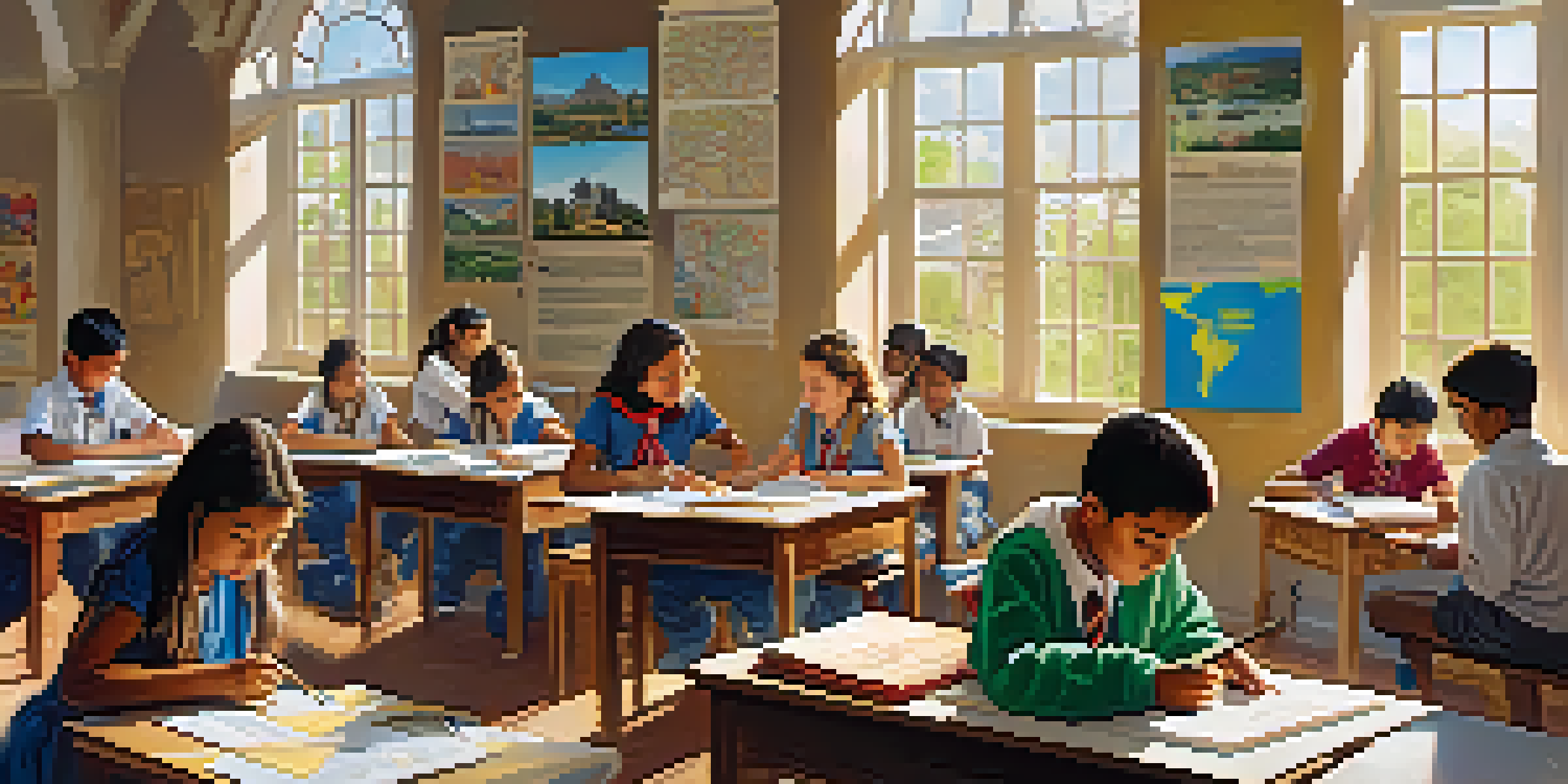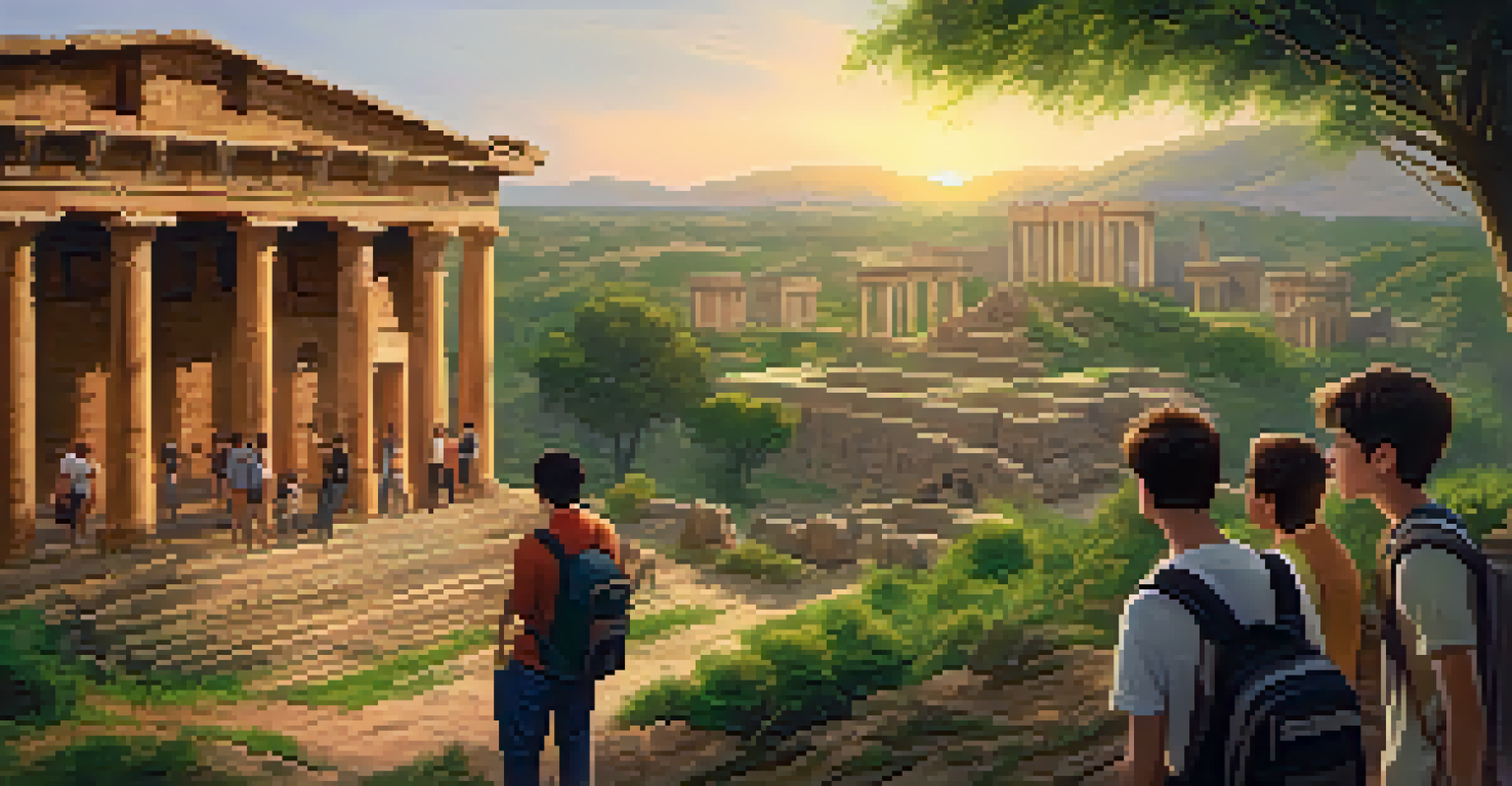Educational Travel: Combining Learning with Adventure

What is Educational Travel and Why Does it Matter?
Educational travel refers to trips designed to enhance learning through direct experience. Instead of sitting in a classroom, students immerse themselves in different cultures, histories, and environments. This hands-on approach not only broadens their horizons but also fosters a deeper understanding of the subject matter.
Travel is the only thing you buy that makes you richer.
When students visit historical sites or engage in local traditions, they gain insights that textbooks often can't provide. This active involvement creates memorable experiences that reinforce the lessons learned. Ultimately, educational travel cultivates curiosity and a lifelong love for learning.
Moreover, such experiences can bridge the gap between theoretical knowledge and real-world application. By witnessing how different societies function, students can better appreciate their own context and the global landscape. This perspective is invaluable in an increasingly interconnected world.
Benefits of Combining Learning with Adventure
Combining learning with adventure can significantly enhance a student's educational experience. The excitement of exploring new places can make learning feel less like a chore and more like an adventure. When students are engaged and excited, they retain information more effectively and develop critical thinking skills.

Adventure in an educational context often involves challenges, which can teach students resilience and adaptability. Whether it's navigating a foreign city or participating in a cultural exchange, these experiences push students out of their comfort zones. This personal growth is just as important as academic achievement.
Educational Travel Enhances Learning
By immersing students in different cultures and environments, educational travel fosters a deeper understanding of subjects beyond traditional classroom learning.
Furthermore, educational travel promotes teamwork and collaboration. When students work together to solve problems or complete tasks, they learn the importance of communication and cooperation. Such skills are essential not only in academics but also in future workplaces.
Planning an Educational Trip: Key Considerations
Planning an educational trip requires careful thought and consideration to maximize learning opportunities. Start by defining the educational goals of the trip—what do you want students to learn? This focus will help shape the itinerary and activities planned during the journey.
The world is a book, and those who do not travel read only one page.
Next, consider the destination and its relevance to the curriculum. A trip to Washington, D.C., for example, can provide students with firsthand experience of American history and government. Additionally, ensure that the activities planned are engaging and interactive to keep students captivated.
Lastly, budget is a crucial factor. Educational travel shouldn’t break the bank; therefore, look for grants or scholarships that might be available for educational purposes. Many organizations sponsor trips that promote learning, so don’t hesitate to reach out for support.
Incorporating Local Culture into Educational Travel
One of the most enriching aspects of educational travel is the opportunity to immerse students in local culture. Engaging with local customs, traditions, and food can significantly enhance their learning experience. This cultural immersion helps students develop empathy and a greater appreciation for diversity.
Consider arranging activities that allow students to interact with local communities. Workshops or guided tours led by locals can offer insights that are often missing from traditional learning environments. For instance, cooking classes can provide lessons in both local cuisine and cultural history.
Adventure Promotes Personal Growth
Combining learning with adventure encourages resilience, adaptability, and teamwork, essential skills for both academic and future workplace success.
Additionally, encourage students to reflect on their experiences. Journaling or group discussions about what they learned can reinforce these cultural lessons and promote critical thinking. This reflection is essential for transforming experiences into lasting knowledge.
The Role of Technology in Educational Travel
Technology plays a vital role in enhancing educational travel experiences. With the help of mobile apps and online resources, students can research destinations, learn about historical sites, and even communicate with local experts before they arrive. This pre-trip preparation can make the experience more meaningful.
During the trip, technology can assist in documenting experiences. Whether through blogs, podcasts, or social media, students can share their learning journey in real-time, fostering a sense of community and connection. These platforms can also serve as valuable reflection tools.
Post-trip, technology enables students to continue their learning. Virtual reality experiences or interactive online forums can provide additional context and deeper dives into the subjects studied during their travels. This continuity helps solidify knowledge and sustain interest.
Challenges of Educational Travel and How to Overcome Them
While educational travel is rewarding, it can come with its own set of challenges. Budget constraints, safety concerns, and logistical issues can sometimes deter schools or families from embarking on these journeys. However, with careful planning and open communication, many of these challenges can be effectively managed.
One way to overcome financial barriers is to explore fundraising options. Hosting events or creating crowdfunding campaigns can help gather the necessary funds for the trip. Additionally, collaborating with other schools or organizations can help share costs and resources.
Technology Enriches Travel Experiences
Utilizing technology before, during, and after educational trips enhances preparation, documentation, and ongoing learning opportunities for students.
Safety is another primary concern. It’s crucial to conduct thorough research about the destination and have contingency plans in place. Establishing clear guidelines and protocols for students can ensure a safe and enriching experience.
Real-Life Examples of Successful Educational Travel
Many schools and organizations have successfully implemented educational travel programs that inspire students. For instance, a high school in California organized a trip to Costa Rica, where students participated in conservation efforts while learning about biodiversity. This hands-on experience not only educated them about environmental issues but also fostered a sense of responsibility toward the planet.
Another example is a history program that takes students to Europe to explore World War II sites. Visiting places like Normandy and the Holocaust Museum provides a profound understanding of history that textbooks alone cannot convey. These experiences leave lasting impressions and inspire students to learn more.

These real-life examples highlight the potential of educational travel to transform learning into exciting adventures. By stepping outside the classroom, students gain knowledge and insights that shape their perspectives and futures.